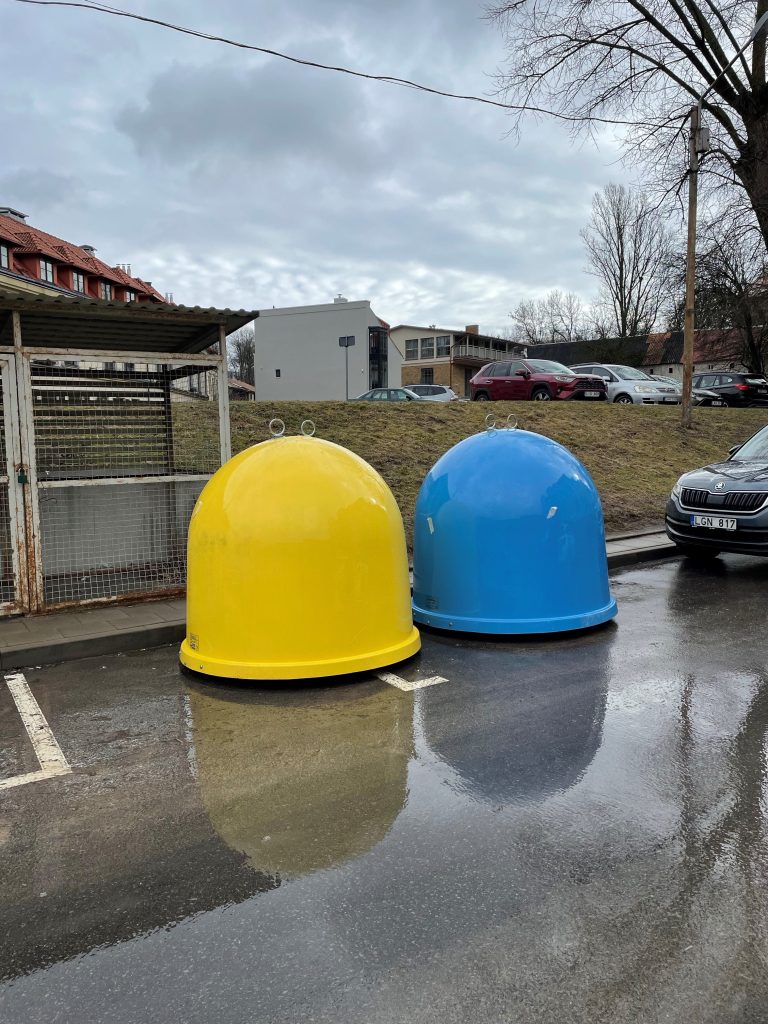At midday on February 26th 2022, a Toyota Prius drove away from Trakai, Lithuania’s former capital. The Ukraine flag attached to its roof was trapped in the back left window, failing to catch the wind. Then the car began to slow. Still in the middle of the road the back left door opened and shut again. As the car drove off, the flag now began to billow in the afternoon air. Inside, the driver had asked the passenger to do this. He explained that it was very important to him; he felt he must show support for Ukraine in the wake of Vladimir Putin’s invasion.
This was just one of the many displays of solidarity that I saw in Vilnius in the weekend that I visited. Flags adorned walls, windows, and roofs aplenty. Parliament house was lit up in Ukrainian yellow and blue. On Sunday an anti-war demonstration had begun in Lukiskes square – the very heart of the city. People were even using bins to show their support for the people of Ukraine (see below). This level of support was not surprising. Not only because it was the immediate aftermath of the invasion (we arrived the day after Putin launched his attack) and so there was a palpable sense of shock and anger, as was felt by many across the world, but also because there are many Lithuanians alive today who can still remember suffering at the hands of Russian overlords.

Lithuania was first occupied by the USSR in 1940 and, excluding a brief stint of Nazi rule during the Second World War, remained under the political authority of Moscow until 1990. During this time it was a victim of multiple acts of Soviet repression. After retaking Lithuania from the Nazis, the Red Army committed mass rapes and brutalised the civil population. The 1940s also saw vast numbers of citizens being deported, without trial, to labour camps in the expansive Russian heartland. It is estimated that this happened to over 130,000 people and it was usually because they were judged to have anti-Soviet attitudes, as opposed to actually having committed any crime. On top of this, an estimated 150,000 partisans and political prisoners were sent to the Gulag as KGB oppression continued through peacetime. In January 1991, following Lithuania’s declaration of independence, Mikhail Gorbachev sent troops and KGB agents to take control of the TV tower in Lithuania. It was a desperate bid to stem the independence movement and prevent the collapse of the Soviet Union. It failed but the events caused the deaths of 14 civilians and ‘Bloody Sunday’ – as it is commonly termed – is now an official day of commemoration.
When one considers that this was only 30 years ago it is easy to see why fear of Russia is still resonant in Lithuanian society. Add to this the geographical proximity and the shared border with Belarus, a state which has now shown its willingness to aid a Russian invasion, then it is no surprise that Lithuania announced an increase of its defence budget to 2.5% of GDP in the wake of the invasion. Ingrida Simonyte, the Prime Minister of Lithuania, recently penned an invited essay for The Economist and she wrote of the predictability of Putin’s latest invasion. Those in the Baltic states have long been aware of the dictator’s ambitions.
Yet, the invasion of Ukraine is on another level, geopolitically, to anything he has attempted since he took power in 1999 and it has understandably shaken citizens. A Lithuanian man spoke to me of the plans he had now had to make in case Putin invades Lithuania. His children and wife would fly to his cousin’s home in Ireland whilst he stayed to fight. One can only imagine the psychological strain that making this kind of plan must take, and he is not an anomalous example. Another local spoke to me about the unshakeable nausea he had felt since Russian troops marched across the border. It had physically put him into a state of shock. The constant threat of invasion looms over him, now more than ever, and so he feels like he is almost waiting for the day to be called to fight.

As the war continues to have a devastating toll on Ukraine and its civilians, one can only assume that this fear will grow. Whilst Russian armed forces have been shown to be less effective than previously believed and the Ukrainian response has exceeded all expectations, one must not get carried away. Russia continues to advance and still possesses the superior weaponry and greater numbers. It is more than plausible that Putin still wins the war in Ukraine, although of course what this means for the future governance of the country remains highly uncertain. Nonetheless, it is unlikely that Putin will want to stop at Ukraine. His desire to be remembered in Russian history alongside his idols Peter the Great and Joseph Stalin means he wants to conquer. It would be foolish to suggest that the problems that he has faced in Ukraine will stop him from starting future conflicts, one cannot judge his actions through a prism of conventional rationality, and on a purely geographical note Lithuania could well be his next attempted conquest. NATO is of course a deterrent and it is very possible that an attempted Russian invasion of Lithuania would be unsuccessful, but to the citizens who would be on the front lines of the war that is no consolation.